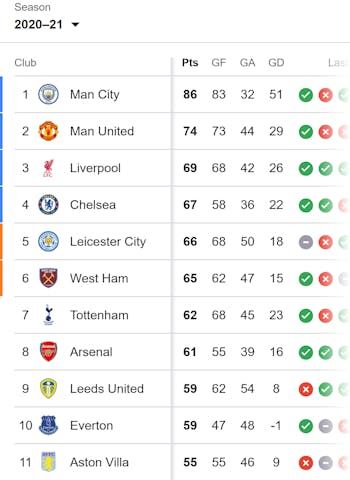Goal Difference in Football Explained
Learn everything you need to know about goal difference in football: What it is, how it is calculated and why it matters.

Short Answer
Goal Difference - often referred to as GD for short - is a way to rank football teams based on their attacking and defensive performance. It is calculated by taking the difference between the number of goals a team has scored and conceded. It is not unusual for bottom-placed teams to have a negative goal difference, therefore.
In addition to highlighting the attacking and defensive performance, goal difference is often used as a tiebreaker when two teams end up on the same amount of points in the standings. Some competitions such as the Champions League, however, use head-to-head points to determine the positions and not goal difference.
How Goal Difference in Football Works
Goal difference (GD) - which was first used to split teams at the 1970 World Cup that was played in Mexico - can be hard to grasp if you are new to football. However, it is a very simple method and the easiest way to come to terms with it is by looking at some examples.
In the 2020-21 season, Leeds United and Everton finished on the same amount of points after all of the Premier League fixtures, with each team having collected 59 points. While little was at stake for the two teams - other than the financial place money awarded to teams - GD had to be used to rank one above the other.

In this example, Leeds had a GD of +8 as they had scored 62 goals and conceded 54. Meanwhile, Everton had conceded 48 times, one more than the goals they had scored, so their GD was -1. Therefore, the final standings had Leeds ranked in ninth with Everton sitting a place below in tenth. Had both teams finished with the same GD and points, then goals scored would be used to split them.
Most major leagues around the world use GD as their primary way to rank teams in the table if they have the same number of points. However, in some cases, the league might instead opt to use an alternative ranking option such as head-to-head record instead of GD. This is the case in the Champions League, as mentioned at the start.
When Goal Difference Is Important for Betting
Goal difference is important in football betting as it is often used as a tiebreaker by leagues. As a result, goal difference is seen as an incentive for teams to score as many goals as they can. For some teams, of course, it could also be an incentive to defend better and be effective in their games - but 'parking the bus' is not a common strategy in that sense.
One of the most famous examples of GD becoming crucial was at the end of the 2011–12 Premier League season, which provided one of the sport's greatest finales of all time. Manchester City and their city rivals Manchester United went into the last day of the season locked together on 86 points, but City had the advantage when it came to GD.
As Roberto Mancini's City had a higher GD than their neighbours, they knew that a win against Queens Park Rangers would almost certainly be enough. Man Utd won 1-0 at Sunderland to move on to 89 points, but City came from behind in dramatic fashion against QPR and thus matched United's points tally. City ended the season with a GD of +64 compared to United's +56, so in effect they won the league title by a GD of +8.
Teams have even been relegated from the Premier League on occasion due to a poor GD. At the end of the 1997-98 season, both Everton and Bolton Wanderers finished on 40 points in the standings. Everton had a GD of -15, while Bolton's GD was slightly worse at -20, and this meant the latter got relegated.
In essence, betting markets such as top-four finish can ultimately be decided by goal difference. Another thing to double-check is that the market has the useful cash-out feature, which is especially handy when placing season bets in football.
Tiebreakers in the Top Football Leagues
Below, you can find the tiebreakers for the top five leagues in Europe, as well as the UEFA competitions.
| ⚽ League | 🆚 Main Tiebreaker |
|---|---|
| Premier League | Goal Difference |
| Bundesliga | Goal Difference |
| La Liga | Head-to-Head Points |
| Ligue 1 | Goal Difference |
| Serie A | Head-to-Head Points* |
| UEFA | Goal Difference |
*This tiebreaker does not apply when the Serie A league title or relegation is on the line. In that case, the teams on the same points have to face each other in a title respectively relegation play-off game.
Best Football Bookmakers in the UK
Below, we have listed some of the bookmakers that are present in our top 10 list of football betting sites.

- Withdrawal Time: 60 Minutes (Our Test)
- Low Betting Margins: 5.4%
- Fantastic Betting App

- Withdrawal Time: 49 Minutes (Our Test)
- Generous Welcome Offer
- Fantastic Betting App

- Withdrawal Time: Instant (Our Test)
- Low Betting Margins: 5.84%
- Daily Prizes Game

- Withdrawal Time: Instant (Our Test)
- Comprehensive Sportsbook
- Fantastic Betting App

- Withdrawal Time: Instant (Our Test)
- Free Racing Streams and Radio
- Fantastic Betting App